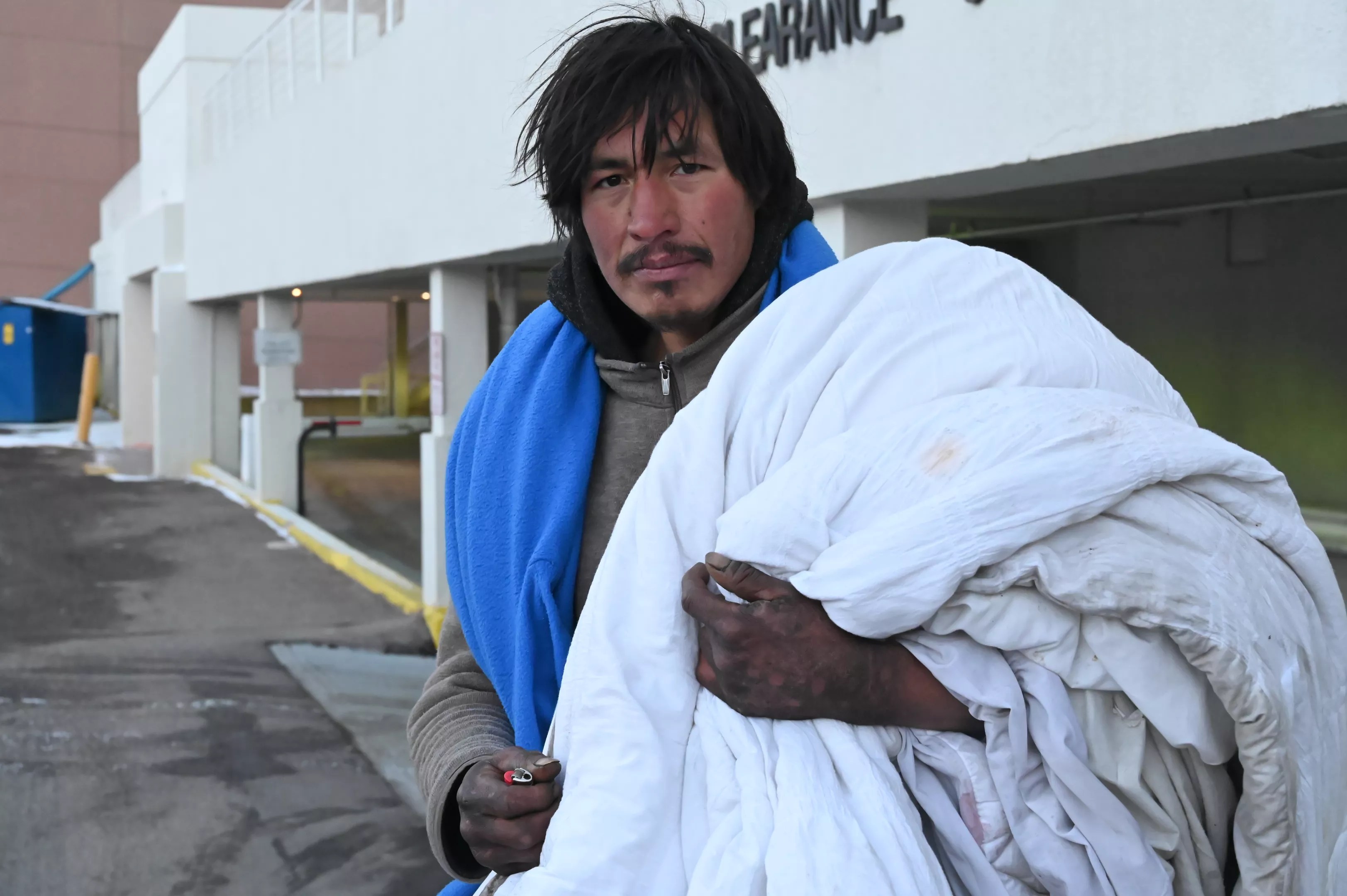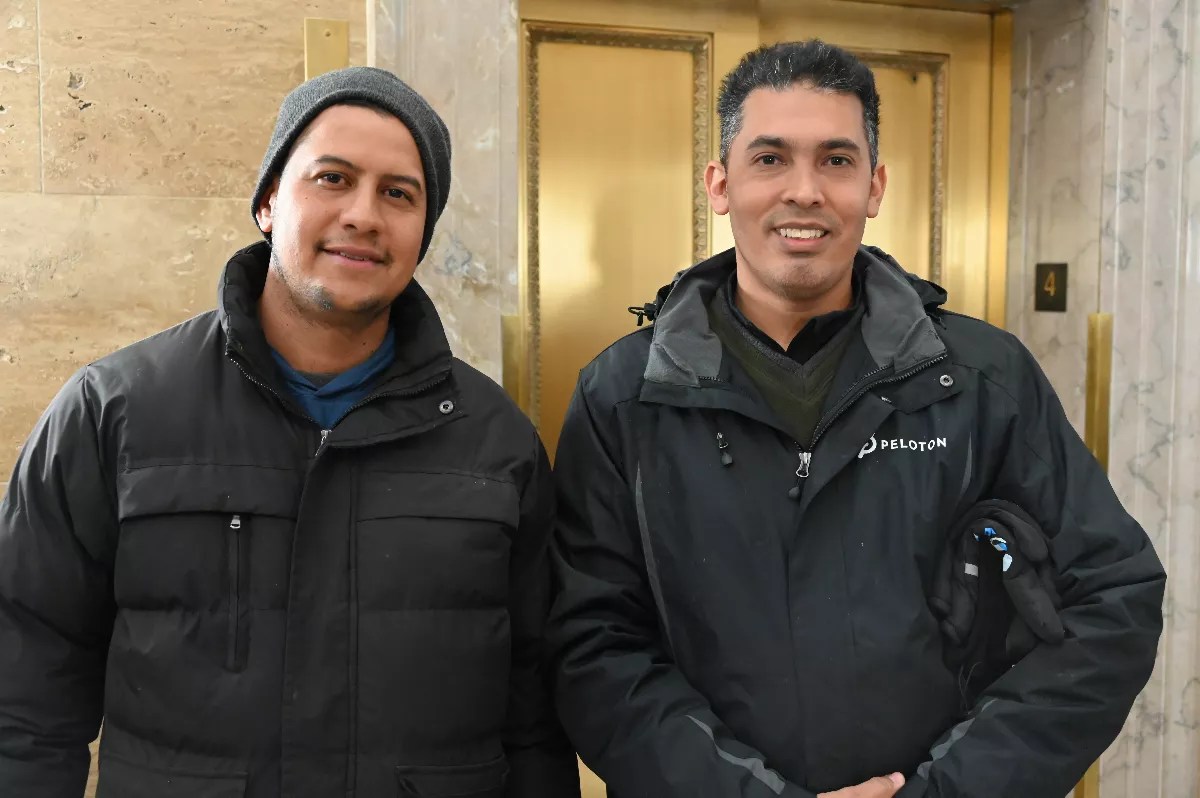
Bennito L. Kelty

Audio By Carbonatix
Temperatures are dropping in Denver, a city where close to 3,000 people were sleeping outdoors in 2023, according to the Point in Time count conducted last January.
Josh Rusher, who has been homeless for 24 years, was trying to keep warm on Monday evening by pacing near the corner of Stout Street and Broadway. He was “super duper cold” and couldn’t “feel my feet,” he said. But he didn’t have a place to go because “everybody got put in apartments and shit but not me,” he added, referring to Mayor Mike Johnston’s House1000 plan that promised to get a thousand people – a third of the 2023 homeless population – off the streets and inside by the end of December.
Johnston made that goal, even if Rusher was still on the street. Nearby, Benjamin Yankton wasn’t too concerned about missing a chance at housing. “Don’t worry about the change,” he said, holding a few heavy blankets he’d found a few days ago. “I’m doing good. I usually find a heater or a fan.”
Yankton has been homeless for six years. Sunday, January 7, had been the coldest night of the winter so far.
The next day, Denver City Council held a public hearing on a proposal that would prevent city agencies, including the Department of Transportation and Infrastructure and Department of Housing Stability, from clearing encampments when temperatures drop below 32 degrees. The idea was first considered in the council’s Safety and Housing Committee on November 22, when members heard about how sweeps can take away important belongings and expose homeless individuals to hypothermia, frostbite, trench foot and chilblains.
“When people are involuntarily displaced without a place to go, they oftentimes are required or have to give up any amount of non-essential goods that they have,” Josh Barocas, a medical researcher with the University of Colorado, told the committee. “We know that moving people, depending on how it occurs, people are less likely to take with them sleeping bags, clothing, etc. … That can exacerbate cold-weather injuries.”
At the January 8 council meeting, members voted 9-4 to add an amendment allowing sweeps to take place on days that are predicted to be below freezing, but only while the temperatures are still above 32 degrees. A second amendment, which passed unanimously, specifies that city agencies can still move people indoors to shelters or offer medical services on below-freezing days.
A final vote is now slated for Tuesday, January 16.
Activists with Housekey Action Network Denver, who call it the “No Freezing Sweeps” ordinance, will hold a rally at 2:30 p.m. in front of City Hall before that council meeting. According to HAND, it’s important to stop sweeps when it’s cold outside because people are often forced to leave sleeping bags, blankets, tents and other winter gear behind when they’re moved on short notice.
“Whatever that protection may be is critical, and often that protection is a tent, and ideally, for people that are lucky, that protection is a tent with a sleeping bag and a blanket and cardboard and hand warmers,” says Terese Howard, the lead organizer for HAND. “But lose all of that gear and you’re not going to be in a situation to survive.”
“You just have to go outside and feel the cold to understand what people go through,” she adds.”Now times that by 24, because most people only go out for an hour here or there as opposed to all day.”

Jose Guerra (left) and Jorge Vides came to City Hall on January 8 to ask council to look for a way to get them jobs and a warm place to stay.
Bennito L. Kelty
While councilmembers postponed the final vote on January 8, they did decide to keep the city’s severe-weather shelters open through next Monday, since temperatures are expected to drop below zero this weekend. Barocas and others have argued that that threshold for such actions should be 32 degrees rather than the 20 degrees that Denver currently uses.
The city’s two emergency overnight shelters are at the Denver Navigation Campus at 4040 Quebec Street and New Directions at 4595 Quebec Street; residents will be able to stay overnight at either location from 7 p.m. to 7 a.m. Three shelters are also expanding services during the cold weather. The city recommends that men go to the Lawrence Street Community Center, at 2222 Lawrence Street; women should go to the Samaritan House, at 2301 Lawrence Street; and youth to Urban Peak, at 2100 Stout Street. Rec centers and libraries will be open during the day, offering refuge from the cold.
Migrants will have access to the same cold-weather services, according to city officials, and migrant shelters will not discharge people while the severe-weather activation is in place.
Several Venezuelan migrants were at the January 8 council meeting, asking the city for both a warm place to stay and authorization to work. Among them were Jorge Vides and Jose Guerra, Venezuelans who said they’d had to sleep outside over the past few days but that everything will fall into place if they can get work.
“The true problem for us migrants is permission to work,” Vides says. “If the council’s participation helps move forward a law or something temporary that can allow the mayor to do something, it would be a huge help.”
“If we can work, we can pay our rent, we can buy our food, and everything will balance out,” Guerra says. “We don’t have work; we’re without permission, so we’re in a tough situation.”
He “shivers, shivers because of the cold” at night, Guerra says, but even though he came from a warmer climate, he thinks that this country’s residents living on the street have just as much trouble with the cold as he does.
“They suffer the same as we do,” he says. “We’re human beings, and we’re sleeping outside. The temperature affects us.”